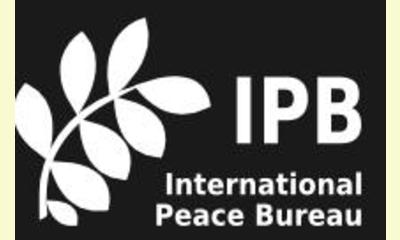|
|
Triennial Gathering of International Peace Bureau
an article by International Peace Bureau (abridged)
The Triennial Gathering of International Peace
Bureau took place 13-15 September in Stockholm
with the theme "The World is Overarmed and Peace
is Underfunded". Here are excerpts from the
summary report. For details about the speakers,
click here.

click on photo to enlarge
The conference was held just at the
critical moment when the balance in the
Syrian chemical weapons drama shifted from
possible USled military strikes to a superpower
deal to eliminate the Assad regime's arsenal. On
the other hand, the continuation on a daily basis
of brutal killings in Syria, Afghanistan,
Iraq was underlined by daily news reports of
bombings, shootings and kidnappings. Each
country was the subject of a session at the
conference. The discussion highlighted the
tendency of political leaders to choose direct
intervention instead of conflict prevention,
peacebuilding and civilian protection
approaches. There was also a set of presentations
on what alternative, non violent strategies at the
grass roots level might look like.
These discussions were preceded by a wide ranging
keynote speech from Joseph Gerson looking at the
continuing imperial role of the USA in today's
multipolar world. Background document
Facts and figures on global military spending were
presented, and IPB speakers once again made the
organisation's case for including military
spending in the UN's Post 2015 Development
Agenda. With military spending at levels higher
than at any time in history ($1.7 trillion in
2012), "it is high time that this huge
financial resource be considered within the
framework of `innovative funding for
development'". We also raised the issue of
the `misuse of brainpower', ie the tendency
for science/engineering/technology to be put at
the service of the military system, rather than on
human needs. The panel also featured a critique of
the Swedish defence posture, and Diakonia's view
of development from a human rights perspective.
Background documents:
Background document on
military spending, Background document on Middle
East
In the Conference final statement: Putting an End
to Militarism, "There was a new hope
expressed at the IPB Triennial Conference,
welcoming the agreement between Russia and the
USA on chemical weapons in Syria. Hopefully this
will lead to negotiations to put an end to the
terrible civil war. The forming of international
coalitions for military intervention is now much
more difficult as public opinion against war has
become so strong. People are weary of war and the
deceit and rhetoric that go with it. They are
suspicious of double speak and are tired of
`humanitarian' statements which end with actions
that simply generate more human suffering...." FULL TEXT
Surrounded by the colourful panels of the IPB
photoexhibition Making Peace, a packed audience
heard presentations from 3 distinguished
speakers: Jody Williams, Mairead Maguire (both
Nobel Laureates) and Terumi Tanaka, representing
the survivors of the 1945 nuclear attacks on
Hiroshima and Nagasaki. In addition we heard
from Anna Ek, Chairperson of IPB member
organisation the Swedish Peace and Arbitration
Society, SPAS, who celebrate their 130th
anniversary this year. Former President MajBritt
Theorin was the evening's moderator.
This year's Sean MacBride Peace Prize was awarded to
Chelsea/Bradley Manning. Col. Ann Wright accepted
the medal on Manning's behalf and promised to
pass it on to her lawyer for onward delivery (see CPNN article of July 19).
. . .
|








|
DISCUSSION
Question(s) related to this article:
How can we know if the culture of peace is advancing?,
* * * * *
Latest reader comment:
One way we can NOT know if the culture of peace is advancing is from projects like the Global Peace Index which has recently been reviewed in CPNN.
The Global Peace Index measures the old dimensions of war and peace, not the new dimensions of culture or war / culture of peace. Peace, in the old paradigm was the period between wars when countries were preparing themselves for the next war. Culture of Peace, the new paradigm, is concerned with the deep roots of war, its cultural basis.
That can explain the paradox that it is the wealthy countries of the North that score highest on the index (Denmark, Austria, Switzerland and Finland), countries of Europe, which was involved in both the World Wars and which continue to profit from the unequal terms of trade between North and South which is enforced by the culture of war.
When I was at UNESCO, the African ambassadors had the following to say: "One should not look to the South for the causes of the culture of war; instead, pose three questions. From where do the weapons come? From where do the violent television programmes come? And where are the terms of trade decided that impoverish the people of the South which leads to violence? "

|
|









